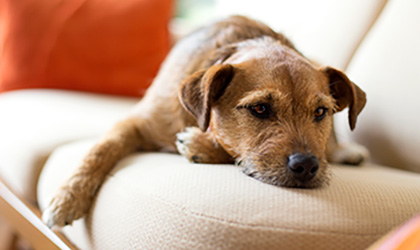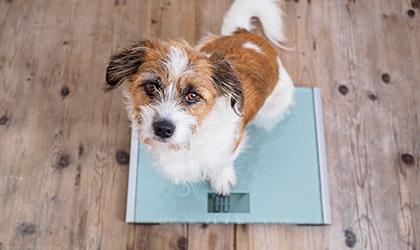
Up there with exercise and emotional wellbeing, nutrition is the essence of life. Feeding your pooch a well-balanced diet is vitally important for his everything from his nose to his tail. It’s responsible for growth, cell maintenance and energy, to name a few. Unsurprisingly then, poor nutrition can have serious repercussions for your little fur ball. But diet extends beyond the mere contents of a ‘dog’s dinner’ – the ritual of eating is equally important too. Understanding when, where and how much to feed your hungry hound will also help lay the foundation for true health and wellbeing. With that in mind, here’s everything you need to know about feeding your ravenous Retriever, peckish Pug and voracious Vizsla.
Different Food Types For Dogs
If you peruse the pet aisle in any supermarket, you’ll find the shelves stacked high with pet food, bombarding you with various health claims and conflicting messages. Understandably then, decision-making can be pretty darn difficult. There’s dry food, wet food (with or without a biscuit mixer), and homemade food. So, what do you choose? Well, the bottom line is whatever you opt for needs to suit the stage of your pooch’s life (puppy, adult and senior) and it’s ‘complete’ (a.k.a. contains the correct amounts of all the essential doggy nutrients, as outlined below).
Vital Nutrients For Dog Health
-
Water: your dog’s body is 80% water; so adequate hydration is key. Kibble contains 10% water, while canned food has up to 80% moisture. Make sure your four-pawed friend has access to fresh water at all times, especially during meals.
-
Protein: the basic building blocks for tissues, cells, organs, hormones, antibodies and enzymes. Chicken, lamb, beef, turkey, fish and eggs are all excellent sources.
-
Carbohydrates: provide energy, play an important role in intestine health and support reproduction. Corn, rice and wheat are carb champs.
-
Fats: essential for the utilisation of some vitamins, the production of hormones, and the structure of cells. Low levels of essential fatty acids could result in skin problems (a.k.a. dry, brittle and coarse fur).
-
Vitamins: most dogs can’t synthesize vitamins in the body, so they need diet to plug any gaps they may encounter. Your pooch needs vitamin A, D, E, K, C and B to remain in optimal health.
-
Minerals: highly important for metabolic reactions, bones and teeth and maintaining fluid balance.
Dry food
Most owners veer towards dry food, thanks to its convenience, economy and comprehensive nutrient formulas. What’s more, it takes much less kibble to satisfy your dog’s voracious appetite, because it’s denser than wet food. Top tip: kibble has a tendency to be, well, dry. Spice things up for your pet by adding some lightly cooked meat, eggs or steamed vegetables. Oh, and you may want to add a cupful of water to meals too, since dry food contains a negligible 10% moisture.
Wet food
The aroma, taste and palatability of canned food are far superior to that of dry food, hence why most pooches go mad for it. Wet food also boasts 80% water, so it’s a convenient way to keep your dog’s liquids up throughout the day. Another bonus: it has fewer calories than kibble, making it perfect for porky pooches. The catch 22, however, is that canned food isn’t all that great for your hound’s gnashers; it can lead to a build-up of plaque, which can contribute to gum disease. To prevent this, feed your dog a mixture of both dry and wet food. That way, everyone wins!
Homemade food
Making your own dog food is especially in vogue at the moment. And for good reason – owners want to know exactly what their beloved companions are eating. Preparing your own pet food is pretty simple, but the golden rule is that it needs to be well-balanced – or ‘complete’ to use the pet jargon. We’re talking about finding that sweet spot between protein, carbohydrates, fats, vitamins and minerals. .
Supplements
Feeding your dog a nutrient-dense, well-balanced food regimen will, undoubtedly, put him in good stead for achieving optimal health. But all the processing and refining of pet food begs to question if your furry friend is really getting all the goodness he needs from commercial food alone. If you want to take your doggie’s diet to the next level, it’s time to consider supplements. A high strength multivitaminwill ensure your pup receives all the essential micronutrients he needs for ultimate nose-to-tail nourishment; while a quality omega 3 supplement will support his skin, fur, eyes and joints. (Pssst…our pet supplements taste so good, your dog won’t even notice!)
Quantity
You can find guidelines on how much to feed your pooch on the back of pet food packaging. A word of warning though: these are just ‘guidelines’, so you may need to adjust your dog’s feeding regimen according to his individual needs – if he leads a particularly active lifestyle, for instance. It’s important to closely monitor your pooch’s weight and body condition. Ideally, you want to be able to feel his ribs and spine ‘readily’, but you don’t want them to be prominent or stand out. You want him to have a waist too. If you are feeding your dog the right amount of food, he should produce dark brown, firm stools. If they’re firm, but softer towards the end, this could signal you’re overfeeding him. Consult your vet if you need further clarification on how much food your dog needs.
Feeding routine
You should divide daily quantities of food across the number of meals you feed your dog. Puppies should be fed little and often (3 times is optimal), while adults should enjoy around two meals a day. Establishing a set feeding routine will enable you to monitor your dog’s food consumption too. Remember; always provide access to clean, fresh drinking water at meal times.
Treats
While it can be tempting to indulge your four-pawed companions in table scraps and unhealthy titbits, these will only increase his waistline (surprise, surprise). Bottom line: try to limit snacks for rewarding good behaviour and always give them in moderation. As a rule of thumb, no more than 10% of your mutt’s diet should consist of treats. Carrots, broccoli, apple and rice cakes are all healthy options.
Foods to avoid
There are a number of foods your furry friend needs to keep his curious little nose away from. Never share these treats with your dog – many will cause unpleasant digestive issues and could even prove fatal.
-
Chocolate
-
Caffeine
-
Grapes and raisins
-
Onions and garlic
-
Alcohol
-
Macadamia nuts
-
Foods containing xylitol – an artificial sweetener
Top tips
-
Never feed pooches from your plate or the table – this will only encourage begging.
-
Feed large breed dogs from raised bowls to stop them swallowing air when eating, as this can lead to bloating.
-
Once you’ve put down your dog’s dinner, leave him to eat in peace. Removing the bowl prematurely could incite distrust and aggression.
-
Never walk your dog immediately after feeding him – this could lead to potentially fatal stomach bloating. Always give your dog at least an hour to digest his food.
-
Ensure your furry friend always has access to fresh, clean drinking water during meal times.
To sum up
Pets are integral members of the family and require just as much nourishing as everyone else. Feeding your four-pawed friend a well-balanced food regimen will equip him with all the nutrients needed to live a happy, healthy life – one that’s brimming with vitality, energy and longevity. In addition to offering a little pizzazz and variety to his diet, adding supplements will give you the peace of mind that all his needs are being catered for.
References:
-
Dogs Trust. (2018). Diet and nutrition. Available online: https://www.dogstrust.org.uk/help-advice/factsheets-downloads/diet%20and%20nutrition.pdf
-
Blue Cross. (2018). Getting your dog back in shape. Available online: https://www.bluecross.org.uk/pet-advice/getting-your-dog-back-shape-and-losing-weight
-
RSPCA. (2018). A healthy diet for dogs. Available online: https://www.rspca.org.uk/adviceandwelfare/pets/dogs/diet


